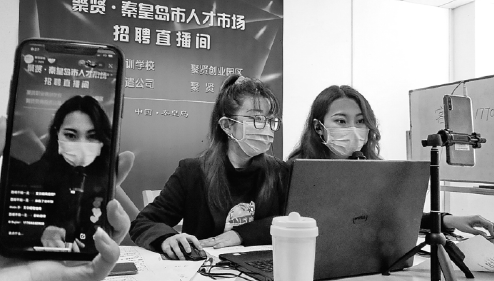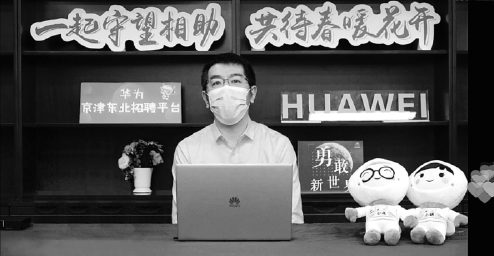Online approach helps job seekers work it out
Virtual career fairs assist graduates in finding employment opportunities, Wang Qian in Beijing and Xing Yi in Shanghai report.

They are there but not there. The audience is invisible. They are somewhere in cyberspace. Zhang Kun, a human resources manager of electronics company Xiaomi, felt a little nervous while speaking to the camera, explaining the jobs being offered and the selection process schedule on March 5. On that date Xiaomi launched its spring campus recruitment via Rain Classroom, an interactive mini-program on WeChat, and video-sharing platform Kuaishou.
"With the lack of instant feedback, it is not easy to know if your message is passed on," Zhang says, adding that lack of eye contact is the hardest part for him.
University graduates across the country have started their job hunt in this virtual way to reduce people-to-people contact amid the novel coronavirus outbreak.
He says while the information that can be conveyed over the internet is limited, his company wants to provide students with as much job information as possible.
"Through the event, we try to answer the questions which, we assume, concern most students seeking jobs," Zhang says.
Xiaomi will provide more than 100 positions during its spring recruitment season. It is among more than 130 companies expected to hold online spring recruitment events with Tsinghua University.
In the three weeks from Feb 24 to March 15, the university held more than 30 campus recruitment events on Rain Classroom and Kuaishou.
Following government suggestions for avoiding gatherings to curb further infection, the ongoing public health crisis has made it impossible to hold traditional public recruiting activities, such as job fairs and on-campus recruitment events. As a result, companies and colleges are turning to the web and social media.
Spring is a peak season for recruitment, with many companies traditionally holding briefing sessions and job fairs on campus where graduates meet prospective employers. But this year, most colleges have kept their doors closed with students stuck at home due to the delay of the spring semester.
Zhang Chao, director of Tsinghua University's Career Development Center, says the recruitment procedure is moving online.
"The epidemic outbreak has accelerated the digitalization of the recruitment sector. In the future, e-recruitment will play a bigger role as an alternative to traditional job-hunting," Zhang Chao says.
He adds that in term of costs, online recruitment is much cheaper than physical job fairs, which need to organize traffic and factor in accommodation and venue costs. Simply put, potential employers can reach a bigger audience on the internet, wherever they are.
More chances
According to its Career Development Center, about 4,000 graduates from Tsinghua University will be seeking jobs this year, with more than 30,000 positions available to graduates nationwide, during the college's recruitment events.
"Not only our students, but also those graduates from across the country can participate and may find their career opportunity through our online recruitment events," Zhang Chao says.
The Ministry of Education estimated that there will be 8.74 million college graduates this year, 400,000 more than last year. It means "huge pressure" on the job market, with the epidemic aggravating the situation, Weng Tiehui, vice-minister of education, told a recent news conference.
At Tsinghua University's first on-campus recruitment event for tech giant Huawei this year, more than 40,000 viewers attended the virtual session on Feb 24, with thousands of resumes sent, which is "unimaginable for an offline recruitment event", according to Chen Jie, deputy head of Huawei Beijing Research and Development Center.
Fang Jierui, an automation major graduate from Tsinghua University, submitted his resume to Huawei during the event from his hometown in Guangdong province.
"To be honest, I was quite worried about the outbreak's impact on the job market," Fang says. "But I am not that worried now, because my school has issued dozens of job information notices every day and has launched various career counseling services. I consulted once and submitted my resume to several companies."
To make job seeking accessible and smooth for all students, Zhang Chao says that the school has opened online counseling services and a hotline to help students better understand online graduation procedures and guide them in career development plan.
Besides virtual campus recruitment events, a large-scale online job fair, jointly organized by Tsinghua University, Hubei Provincial Career Development Center for College Graduates, Wuhan University and Huazhong University of Science and Technology, is being held from March 16 to 20. The number of participating companies and organizations is expected to reach more than 600, double that of last year.
The fair allows students to visit virtual "booths" set up by participating employers on the websites of Tsinghua University's Career Development Center and Hubei Provincial Career Development Center for College Graduates.
At the fair, students can review job opportunities, drop off their resumes and receive interview requests from recruiters remotely.
Besides these, Zhang Chao says an instant message feature will enable students to interact with recruiters through audio calls, or texts, to enhance user experience.
Zhang Chao says that there was a special recruitment section this year targeting overseas students on March 17 for more than 600 international graduates at Tsinghua University. More than 100 companies are taking part in the event.
Meanwhile, to help Wuhan, Hubei province, to recover from the coronavirus outbreak, there is also a section for companies in the city at the fair.
Next month, a virtual career fair organized by Tsinghua University and the Beijing College Graduate Career Center will be held, and more events are on the way, Zhang Chao says.
E-recruitment trending
Tsinghua University is among many colleges nationwide embracing this digital transformation in recruitment due to the outbreak.
In Shanghai alone, universities and colleges are expected to hold more than 50 online career fairs with more than 100 companies participating in each fair, according to the local education bureau.
To cope with a drop in hiring demand, the Ministry of Human Resources and Social Security will work to expand employment channels for college graduates, encourage online hiring activities and offer more internships.
The ministry also encourages more graduates to seek work at grassroots level, in rural areas or small and medium-sized enterprises, even to consider applying to enlist in the Chinese armed forces.
A 24-hour online campus recruitment service has been launched by the Ministry of Education. The service is available on the ministry's campus recruitment portal and five leading job-hunting websites-51job, Zhaopin, BOSS Zhipin, ChinaHR and Liepin.
Zhaopin has partnered with more than 100 higher education institutions to launch online hiring campaigns.
The online job platform organized 41 virtual career fairs between Feb 26 and March 8, in which more than 22,000 companies and around 221,000 students participated, with an average video interview lasting three to eight minutes.
Li Qiang, executive vice-president of Zhaopin, says the impact of the epidemic on spring recruitment is limited.
"It disrupted job fairs which were due to be held offline. However, it boosted online recruitment," Li says, adding that students are more proactive online.
"Our survey shows over 52 percent of students want to take online interviews, and 80 percent of employers accept such forms of recruitment," he adds.
Moka, a recruitment consultancy in Beijing, says that the epidemic outbreak has pushed the company to accelerate the digitization of their HR management, which has been taking place gradually over the past few years.
"Using online platform can raise hiring efficiency, process more applications and build a larger talent pool," according to a report by Moka.
"Traditional HR specialists rely heavily on an offline approach. Now they have to learn more digital tools, and become more willing to embrace the information technology revolution. In the future, we will see more and more online recruitment in China," the report states.
Users' feedback
While companies welcome the digital recruiting trend, many students find this new way saves time and money.
Zhu Hongwei, a senior student at Tongji University in Shanghai, found online recruitment convenient because it saves travel time and avoids the risk of contracting disease. His university opened its online job recruitment events on March 5.
Zhu has since taken two online interviews and is waiting for the results, one with video-sharing website Bilibili, the other with Xueersi, a K-12 tutoring company of the TAL Education Group.
Tang Xiaofan, a graduate student at the Chinese University of Hong Kong, says she is not sure whether she can secure a job in Hong Kong, and has started applying online for positions at Chinese mainland companies.
"The online job fair gives us more opportunities, otherwise I cannot afford frequent travels from Hong Kong to Shanghai to take interviews," says Tang.
Shen Yifan, an accounting student at Shanghai International Studies University, says he has got a return offer from the consulting firm PwC where he took an internship during the winter break.
"I previously thought it would be my backup offer, but I accepted it because the competition has become more fierce now," he says.
Talking about the effect of online recruitment events, Qian Dasheng, HR director at Hesai Technology in Shanghai, says that companies, too, are having to raise their game.
Hesai held an online campus recruitment event via Rain Classroom and Kuaishou on Feb 26.
"The lack of timely interactivity means that companies must be more creative. For instance, you can bring in several hosts to make the event more interesting and vivid," Qian says.




Today's Top News
- Mainland spokesman reiterates stand on Taiwan
- Xi to attend opening ceremony of National Games, declare Games open
- Xi urges deepening reform, opening-up during Guangdong inspection tour
- China releases white paper on low-carbon development
- What use are the humanities in the age of AI?
- Cameroon president congratulated on re-election






























